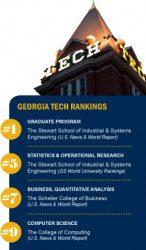
“Analytics spans the fields of statistics, operations research, computing, and business. The Georgia Tech Master of Science in Analytics degree is one of the few truly interdisciplinary analytics degrees that include all of those areas. As a result, our graduates will be uniquely able to think across the disciplines as they generate deeper insights into analytics problems,” said Joel Sokol, director of the MS in Analytics program.
This interdisciplinary degree program leverages the combined strengths of Georgia Tech in statistics, operations research, computing, and business by melding the world-class expertise of the College of Engineering’s Stewart School of Industrial & Systems Engineering, the College of Computing’s School of Computational Science and Engineering, and the Scheller College of Business. By combining the strengths of these nationally ranked programs, graduates will be afforded the opportunity to integrate analytic skills in a unique and interdisciplinary way that yields deep insights into analytics problems.
One of the central objectives of the program will be to produce graduates who will be ready to enter the workplace with the computing, business, statistics, and operations research skills needed to immediately identify, analyze, and solve analytics problems for better business intelligence and decision support. Georgia Tech’s Master of Science in Analytics graduates will be able to move directly into business, industry, and government positions where they can apply the practical knowledge they have gained to immediately benefit their employers.
Program participants will have access to a state-of-the-art analytics lab with high-performance computing infrastructure for massive-scale data analytics, and will learn to:
- identify and frame problems;
- acquire, manage, and utilize large and fast-moving streams of data;
- create, analyze, solve, and interpret mathematical models using appropriate methodology; and
- integrate these interdisciplinary skills to successfully develop and execute analytics projects.
Beyond these core skills, participants will focus on one of three tracks that will provide additional depth in specific area of analytics:
- Analytical Tools: This track provides students with a greater understanding of the quantitative methodology of descriptive, predictive, and prescriptive analytics: how to select, build, solve, and analyze models using methodology such as parametric and non-parametric statistics, regression, forecasting, data mining, machine learning, optimization, stochastics, and simulation.
- Business Analytics: This track provides students with a deeper understanding of the practice of using analytics in business and industry: how to understand, frame, and solve problems in marketing, operations, finance, management of information technology, human resources, and accounting in order to develop and execute analytics projects within businesses.
- Computational Data Analytics: This track provides students with a deeper understanding of the practice of dealing with so-called “big data”: how to acquire, preprocess, store, manage, analyze, and visualize data arriving at high volume, velocity, and variety.
Analytics is an important and quickly-growing field, and has quickly become a key facet of business strategy. The field is still new enough that its need has clearly outpaced the supply of students and will do so for the foreseeable future. With this new program, Georgia Tech will fill that gap by producing top graduates in the field.
For more information, visit www.analytics.gatech.edu.
Related Links
For More Information Contact
Barbara Christopher
Industrial and Systems Engineering
404.385.3102
